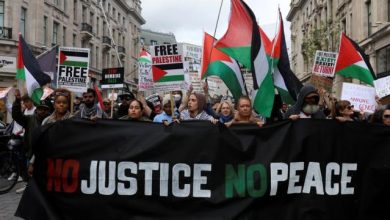This distinctive narrative from the heart of the bitter conflict between Israel and Palestine cast a new light in the turmoil. It articulates the poignancy of human experience, touching verses and underlying unconscious insights that go overlooked in mainstream discourse. The heart of this story is Real. Palestinian journalist and photographer Moatz Azaiza stands at the epicenter of it all. His work shows not only the painful reality of conflict but traverses that labyrinth where collective memory, suffering and resilience intermingle. Azaiza tried to gain recognition as a photojournalist from the age of 13. Born into the crucible of conflict on January 30, 2002 in a Gaza refugee camp, the young Azaiza was shaped by years of suffering.His life story, scarred by personal tragedies such as losing relatives in a bombing raid, is a touching human drama that resonates with all Palestinians. A graduate in English language and literature from Al-Azhar University, Gaza, Azaiza’s entry into the realm of journalism was propelled by a sincere aspiration to articulate the untold stories embedded in the collective consciousness of his people.
Azaiza’s Artistic Journey: A Testament to Resilience and Humanity
Azaiza’s journey commenced on Instagram, where his eloquent visual storytelling emerged as a potent testament to the indomitable human spirit confronting adversity.
In the captivating narrative that unfolds, Azaiza’s own odyssey mirrors the collective heartbeat of a people navigating the tumultuous sea of conflict. The depth of his personal experiences, including the profound losses suffered in the crucible of violence, lends an authenticity to his work that transcends mere journalistic documentation. Graduating from Al-Azhar University infused Azaiza with a nuanced understanding of the power of language and literature, steering him towards a role where every photograph becomes a carefully chosen word in the larger narrative of resilience and survival.
Commencing his journey with a camera lens as his quill, Azaiza became an inadvertent poet of the Palestinian struggle. His entire Instagram gallery has turned into a touching anthology, with each picture telling a story of courage and wretchedness, yet also unwavering hope. This virtual sanctuary gave him an arena independent of geography, where the whole world could watch and feel with him all the manifold scenes of Israel-Palestine conflic better than anyone else.
GQ Middle East Recognition: Illuminating the Power of Art and Truth
The recognition bestowed upon Azaiza by GQ Middle East, honoring him as the Man of the Year in 2023, is more than a mere accolade; it is a reverent acknowledgment of the profound literary and historical significance woven into the fabric of his visual tapestry. In a world where narratives of conflict are often manipulated and obscured, Azaiza’s photographs stand as eloquent chapters in the universal chronicle of human history.
As we delve into the entrancing narrative, Azaiza’s journey is not just a testament to personal triumph over adversity; it is an exploration of the collective memory etched in the souls of a resilient people. The empathic echoes of his experiences resound in every pixel of his photographs, reflecting the nuances of a narrative that transcends geographical boundaries and cultural barriers.
Azaiza: A Modern Bard in the Grand Narrative
In the grand narrative of the Israel-Palestine conflict, Motaz Azaiza emerges as a modern bard, wielding his camera as a lyrical instrument. His life story, narrated through visual poetry, resonates with the heartbeats of a people determined to be heard amid the clamor of conflict. In the hallowed halls of English literature, Azaiza’s work becomes not just documentation but an exploration of the human spirit’s capacity to endure, resist, and ultimately transcend the confines of turmoil.
GQ Middle East’s Acknowledgment: A Tribute to Journalistic Fearlessness
This acknowledgment by GQ Middle East illuminates the profound impact that literary and visual narratives can exert on shaping collective consciousness.
The announcement by GQ Middle East underscored Azaiza’s fearlessness in confronting the grim realities of conflict. It is a commendation not only of Azaiza’s individual courage but also an acknowledgment of the broader cadre of journalists who, like him, navigate perilous territories to unveil truths that demand reckoning. In celebrating Azaiza, GQ Middle East pays homage to the literary warriors who wield their pens and lenses as instruments of truth, unraveling the intricacies of the conflict one poignant image at a time.
A Collective Narrative: Remembering the Names
The inclusion of names like Plestia Alaqad, Hind Khoudary, Wael Al-Dahdouh, Issam Abdallah, and Shireen Abu Akleh in GQ Middle East’s announcement is a poignant reminder of the collective effort required to chronicle the complexities of conflict. These individuals, in their pursuit of truth, embody the ethos of literary and historical inquiry. Their narratives, woven into the fabric of Azaiza’s broader tapestry, serve as a chorus of voices challenging preconceived notions and historical oversights.
Azaiza’s Lens: An Evocative Language
Azaiza’s lens is not merely a visual instrument capturing the physical devastation of conflict; it is an interpretive tool delving into the emotional terrain of the Palestinian psyche. In each carefully composed image, he distills the collective memory of a people besieged by strife, offering a nuanced perspective that transcends the boundaries of geographical and cultural specificity. Through the lens of a scholar of English literature, Azaiza’s photographs become an evocative language, inviting readers to interpret the narratives etched on the faces of those he captures.
Personal Connection and Plea for Recognition
His personal connection to the conflict, exemplified by the loss of relatives during an airstrike, imparts a depth of authenticity to his work. As Azaiza articulates his lived experience in what he describes as a “dark place,” his narrative assumes the qualities of a literary testimony, chronicling the individual’s navigation through the labyrinth of personal grief and societal upheaval. Azaiza’s plea for recognition, not merely as a journalist but as a chronicler of history, resonates with the yearning for acknowledgment that permeates the broader Palestinian narrative.
A Call for Understanding and Empathy
In a heartfelt conversation with The New Arab, Motaz Azaiza shares the difficult times Palestinians have faced for many years. His request for people worldwide to understand their struggles is a bit like stories from a long time ago when people wrote about unfairness and asked for things to be made right. It’s not just about saying, “Hey, look at us,” but more about asking everyone to truly get why Palestinians have been through so much.
Motaz Azaiza talks about the hard times that Palestinians have been going through for seventy years. This is a really long time, and it’s made their story a powerful one. He wants everyone to know about the tough things they’ve had to face, like losing their homes and having a difficult life. It’s like telling a big story about how strong Palestinians are, even when things are tough.
Azaiza’s wish for people all around the world to know about the struggles of Palestinians is similar to stories we read where people wrote about how things should be fair. It’s not just about saying, “Hey, look at us,” but more about asking everyone to really understand the history, culture, and feelings of the Palestinian people. He wants us to know that it’s not just about recognising them but also understanding what they’ve been through.
The most important thing Azaiza wants is for people to feel what Palestinians are going through. He wants us to understand how hard it is when families have to leave their homes, when there’s fighting, and when basic rights are taken away. Each word he says is like a voice from many generations, sharing stories of people who’ve had to leave their homes, face fighting, and not have the basic things they need.
When Azaiza talks about the tough realities his friends and family are going through, he’s like a storyteller sharing the experiences of Palestinians. It’s not just him saying it; it’s like all the people together telling everyone about the hard times they face. He wants everyone, no matter where they are, to try and feel what it’s like for Palestinians dealing with losing homes, facing fights, and wanting to have their own say.
He’s asking all of us to understand this difficult story, to not just know the big things but also to feel what it’s like for families who’ve faced lots of challenges. He wants us to see past the news and numbers, and really get how much hard times can hurt people.
In the end, Azaiza’s request for people to understand and feel for Palestinians is like an important part of the ongoing conversation about Israel and Palestine. It’s not just about politics; it’s about asking all of us, no matter where we are, to care and understand the hard times that people have faced for so long. It’s like a plea for everyone to remember the pain, struggles, and feelings of Palestinians, so that we can be more understanding and kind in our own lives.


